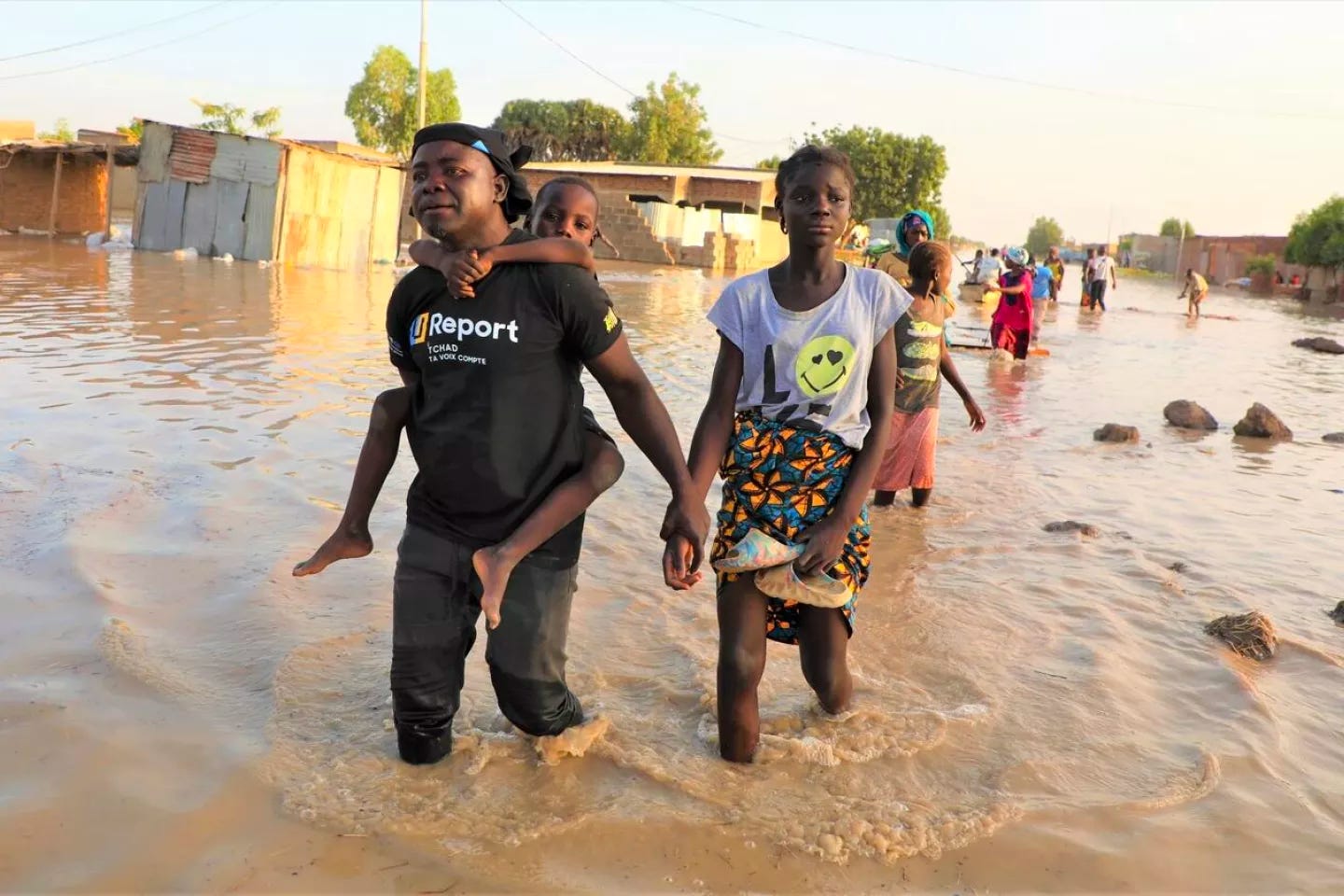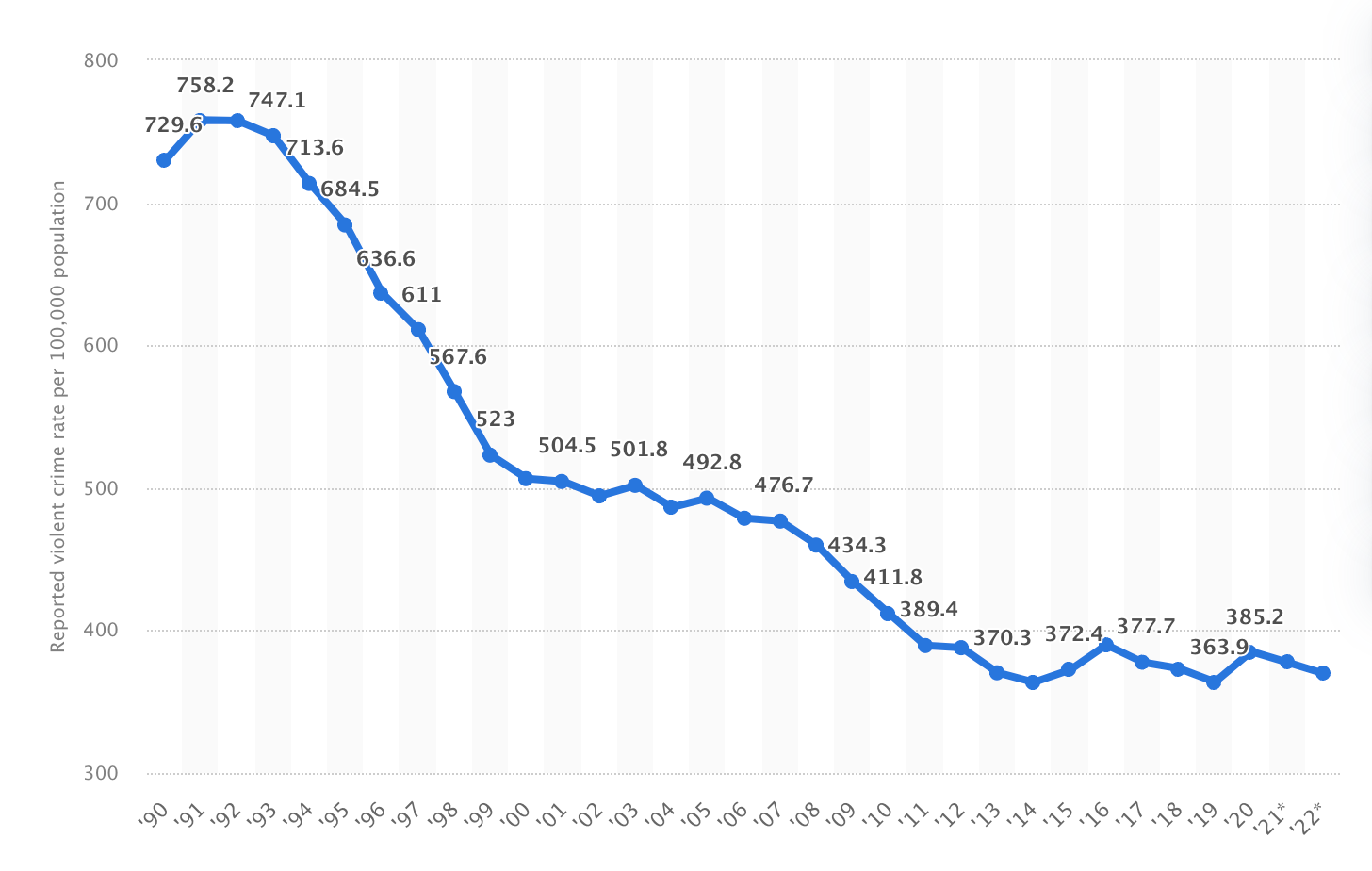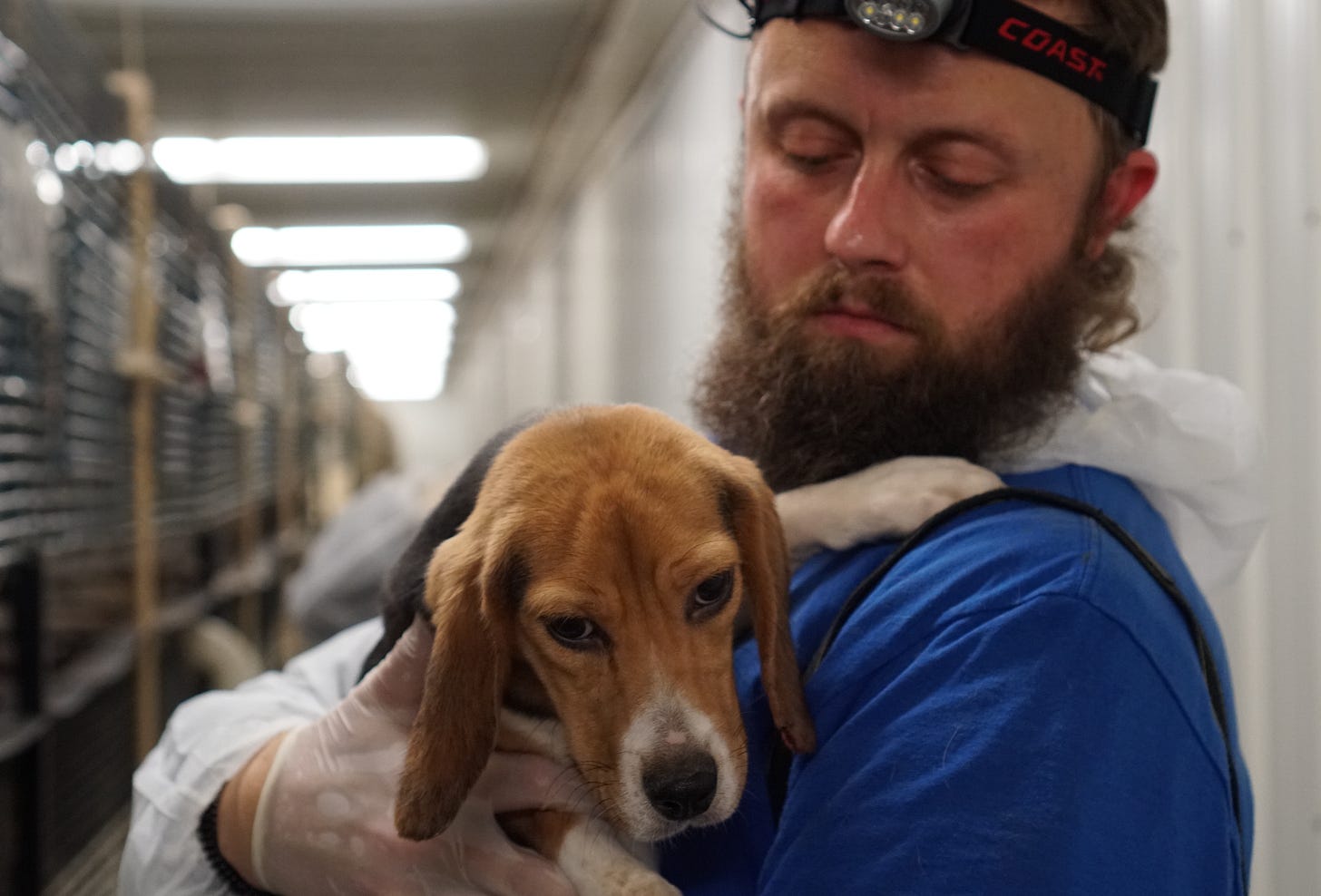The Two Words That Can Save Millions of Dogs
In the face of fear and cynicism, two words will change everything: I can.
It’s April 17, 2017, and I am inside Ridglan Farms, one of the world's largest beagle breeding and research facilities. I am facing an impossible choice: whether to go back for the dog we left behind.
Moments earlier, I saw her for the first time: the dog with the serial code DPS6 branded into her ear. In the chaos of dogs howling and clawing at cage walls, she was at first unremarkable. Tens of thousands of dogs from Ridglan have died in the most gruesome experiments in animal rights history: mutilated to test new methods of plastic surgery, poisoned with fentanyl, and injected with rabies. DPS6 is just a drop in an ocean of suffering.
But after a few minutes of watching her, I realize something is deeply wrong with DPS6, even by the standards of this place. Her eyes are wild and unfocused; she looks through us as if some unseen terror is lurking beyond her line of sight. She is spinning frantically, unable to understand why she cannot escape the walls of her tiny cage. Over many hours, the spinning never stops. This dog is not just afraid; she has been driven to insanity by this place.
I am tempted to stop our investigation. Shut down all our cameras. And just hold this poor creature and tell her she’s safe.
No one will ever hurt you again, I imagine saying.
But our goal is to show the world Ridglan, not just one dog. I note DPS6’s position and move on to the next set of cages.
Minutes later, alarms go off, apparently triggered by an opened door. We scramble to gather our gear, including a 50+ pound virtual reality camera rig. We don’t have a moment to lose before security arrives.
I look down the aisle, where we found DPS6. I imagine the months of anguish she’s endured that left her in such a broken state.
I need to save her.
One of our team members tells me a security truck has arrived. I look down the aisle again. I am tempted to grab DPS6 and run.
I can’t.
I turn away and head towards the exit. I wonder if DPS6 will hate us for leaving her. I wonder if I will hate myself.
The anthem of defeatism
I am not the only one saying, I can’t. Those two words have become an anthem, of sorts, for the modern age. Forty-five percent (45%) of Americans in 2023 say they can’t handle emerging technologies, with concern over artificial intelligence hitting the mainstream. Fifty-nine percent (59%) of Americans can’t deal with climate change. Climate anxiety is now so bad that many are saying they can’t have kids. But the single greatest source of I-can’t-ism is concern over safety. In a May 2023 poll by the American Psychiatric Association, a stunning 70% of Americans say they’re anxious because they can’t keep their families safe. This is perhaps part of the reason Americans are staying home at rates never before seen in recorded history. Millions of Americans can’t leave home because the outside world seems so dangerous.
But there’s something curious about saying I can’t. For example, while nearly half of Americans say they can’t deal with technology, an MS-DOS computer from 1989 required users to know around 114 software commands, including terms such as “xcopy” and “intersvr.” Modern computers are a piece of cake by comparison. And while the most devastating impacts from climate change have occurred in developing countries like Chad, where flooding in 2022 endangered 1 million people, it is people in the United States (1.64 births per woman) and Europe (1.53), not Chad (6.35), who say they can’t have kids.1

But I-can’t-ism is most difficult to justify regarding safety. While 70% of Americans fear they can’t keep their families safe, only 1% have been actual victims of violent crime, with the majority of those cases being simple assault (which requires only a threatening gesture, not a blow that actually lands). In fact, violent crime is now about half of what it was in 1990. Even those who sounded the alarm about rising crime in the post-COVID era have now concluded that “America seems to be experiencing a peace wave.” That hasn’t stopped Americans from being afraid.

The moral of the story is that the things that block us from acting, even in seemingly risky situations, aren’t as significant as they seem. And if people saw the real risks associated with their actions – whether adopting a new technology or leaving the house at night – then I can’t might be replaced with I can.
I know this through personal experience. For decades, I was terrified to take action for animals. As a child in China in 1989, I quivered in fear as dogs – the animals I loved more than anything – were slaughtered outside of a restaurant. As a teenager in the 1990s, I was too scared to tell people I wanted to be a vegetarian; I thought they’d think me less of a “man.” And as a graduate student in 2003, I was too frightened to go to an animal rights protest, even after being shown video of beagles being brutally beaten at a lab called Huntingdon Life Sciences (HLS). I was haunted by their screams (which are still available on YouTube below), but I refused to act.
Over and over, I said, I can’t.
Then, in a moment of crisis, that changed. In 2007, I’d failed at my life’s purpose – to become a professor – and decided I would walk into a slaughterhouse to rescue an animal. I was suicidal and, I thought, if I’m going out, I might as well do something good before I die. And yet even though my attempts to save an animal on that night failed, I realized something important: It was trivially easy to get into the slaughterhouse. I just walked through an unlocked gate. When I was caught by a worker on one of my first few trips, he didn’t even care that I was there.
What this taught me is that I can. I can walk into places that no one else has seen. I can cross lines that no one else dares. And while I failed on that first night, I can save a suffering being on the brink of death.2
I can replaced I can’t. And that change in mentality transformed my life.
“I can do this.”
On the night of April 17, 2017, after we left DPS6 behind, images of past failures flashed through my mind. I saw the dogs shivering in cages outside of a restaurant in China. I heard the beagles shrieking as they were beaten for resisting deadly injections at HLS. And I thought again about DPS6, alone and spinning in her cage.
That tiny metal world was her entire life. She had never seen the sun, slept on something soft, or been given a hug from someone she loved. All she knew was harshness and fear. I realized that, in my haste to keep myself safe, I had forgotten that there was someone else who was depending on me for so much more. Someone who needed me to see that I can.
For a moment, I deliberated with the team. We had previously discussed the risks of a confrontation with security. In all the many years that I, or teams I’ve trained, have entered animal-abusing facilities, there has been only one instance of significant violence: in Yulin, China, when dog meat traders beat me up outside of a slaughterhouse. For all the rest, the greatest risk of open rescue is that someone hurts themselves while running away. We also discussed legal risk. I reminded the team that, of the dozens of activists who had participated in open rescue in US history, only 2 had served significant jail time: Adam Durand (1 month) and Amber Canavan (1 month).3 DPS6, in contrast, had spent her entire life in a cage; if we left, she would never escape.
I told the team we should go back for DPS6.
“I can do this,” I explained. “We can.”
And everyone agreed.
Shortly thereafter, we walked out of Ridglan with DPS6 in our arms. Much to our surprise, given her desperation in the cage, she quickly settled in our arms.
“No one will ever hurt you again,” I said as we carried her through the night. But this time, my words were not a dream. They were a promise – one that I intend to keep, not just for DPS6, but for the thousands of beagles we left behind.
The secrets of Ridglan Farms
We found many secrets in Ridglan Farms. We saw the wretched living conditions – solitary metal cages, often stained with feces – that beagles endure in vivisection facilities. We saw untreated infections and wounds that had many dogs hobbling in pain. We discovered that DPS6 was not just psychologically broken; she was blind, spinning endlessly to escape a world that had gone dark. But by far the most important thing we found was within ourselves. We found the power to say I can.
And that power has already transformed the world. DPS6 is no longer just a serial code. DPS6 is who she was meant to be: Julie, beloved by her family, and one of my dearest friends. Though she is blind, she is a light on our lives. And it is hard to even believe that her light was almost put out.
But what is true of DPS6 is true of all the other thousands of dogs at Ridglan, and animals trapped in cages across the globe. They are depending on us to say I can. That doesn’t mean every one of us must walk into a lab or slaughterhouse. Each of us has a role to play in a multifaceted strategy for social change. But we all must clearly see the vision – a world where every sentient being has the right to be free – and be willing to sacrifice for that vision. We must challenge ourselves to say I can.
If we do, the day will come when we rescue not just one broken beagle but all 3000 dogs from Ridglan Farms. The millions of other dogs and cats who are killed for the crime of being unloved. And the 10 billion animals who are suffering in captivity in the United States. We will take every one out of a cage and show them the bright blue sky, give them the freedom to play in a grassy field, and let them feel the power of love.
And those words – No one will ever hurt you again – will be not just a dream but a constitutional right.
The next stage in that fight begins on March 18, when we go on trial for saving Julie from her cage. And I’ll explain why that stage is so important in our next newsletter. Stay tuned for more.
What’s up this week
A Pulitzer Prize winning journalist, Glenn Greenwald, had us on his show this week to discuss the corrupt ties between the government and factory farms. It’s not my best interview, and the audio is a little spotty in parts. But you can check out the video here:
I also had the pleasure to have a wide-ranging conversation with activist and influencer David Ramms. This was one of the most fun discussions I’ve had in a long time, and we covered everything from my experiences as a “terrorist” in jail to the terrible toll of infighting in the movement. Check it out (and sorry I look so unkempt)!
A good friend recently challenged me to be more candid about my views regarding Gaza, concerned that I was whitewashing atrocities. I thought it was a fair point, given that I’ve blogged twice about the conflict. So here is my position: the violence must stop. While the massacre by Hamas on October 7 was deplorable, a ceasefire is not just strategically desirable but a moral imperative. That is especially true when one party has vastly more power than the other. And there seems to be no question that the Israeli army has not just refused peaceful alternatives to the bombings in Gaza but also committed war crimes. This includes the indiscriminate use of 2000 pound bombs in areas that have been designated “safe.” And the killing of people who are completely harmless and unarmed, e.g., Israel’s own hostages. At the same time, I’d be remiss to not also acknowledge that I have seen anti-Semitism in the global campaign for Gaza. For example, voices within the animal rights movement have called for all Zionists to be banned. Rhetoric like this seems, at minimum, counter-productive and very likely anti-Semitic — in impact if not intent. It also does not help victims in Gaza, as it has turned the Jewish diaspora against the campaign for peace.
Where does that leave us? In a complicated place. One of the many reasons I left my graduate studies in behavioral science is that the problems of human conflict and suffering are so hard. (In contrast, animal liberation is a piece of cake.) But I will add this final thought. Whatever your position on Gaza, the world does not become a better place from bitterness and infighting. If we want to make change, we need a positive vision — and the willingness to sacrifice for it. Tearing other people down, especially potential allies, won’t help. This is one of the few ironclad lessons of social change. So let’s collectively build a space where that sort of positive vision setting can happen.
There are of course many other reasons for this large difference in birthrates — most notably, the educational opportunities given women in the US and Europe. Women tend to have fewer children when given more opportunity. And yet the point remains: in the nations where climate change is least frightening, parents are most worried about it.
I realized it would be relatively easy to get a few people into the stockyard and, together, carry a 120 pound lamb out.
That has changed since 2017 in two ways. First, hundreds more have participated in open rescue in the United States, most notably through mass open rescues organized by DxE. Second, one other person has served jail time: me. I currently hold the longest single stay in jail related to open rescue: 38 days.
I do not mean to suggest more serious sentences aren’t possible. They are — and it would not surprise me if someone eventually serves many years. (Perhaps I will.) However, the risks that any particular activist will be the one to receive a severe sentence are very low, given the relatively small punishments imposed on activists across the globe for open rescue.




Being anti-Zionist has absolutely nothing to do with antisemitism. Not all Zionists are Jews and not all Jews are Zionists! Fact. Biden has even said on camera, a few years ago, that he is a Zionist! The Zionist government of Israel has been working long and hard to equate anti-Zionism with antisemitism. Don't fall for the propaganda. There are many thousands of Jews who are anti-Zionists!
Choosing love and compassion is never wrong. It is all realted. People continue to pick sides and justify killing when what the world really needs is caring and compassion. Thanks for speaking out Wayne.